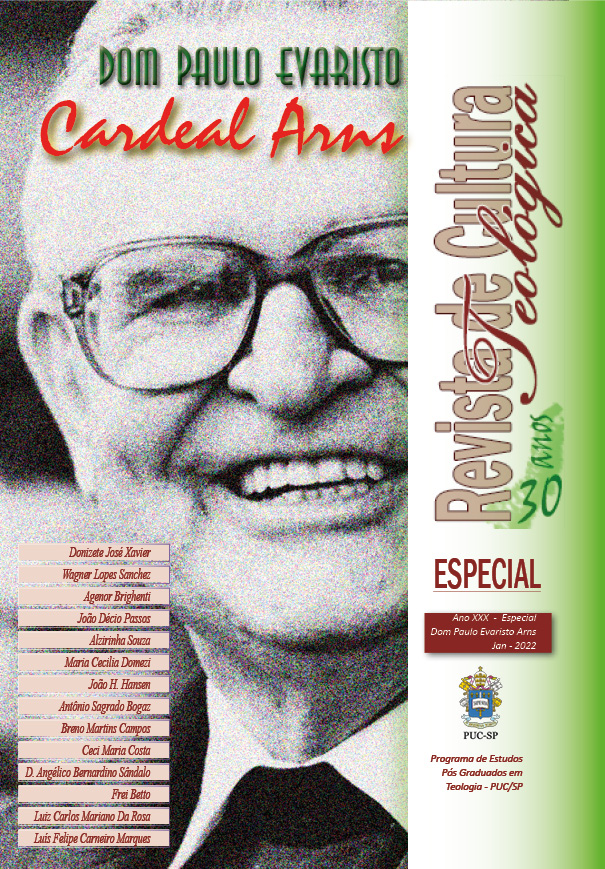Of justification and faith as an escatological event while obedience and decision founded in the act of the god’s grace according to the Theology of the apostle Paul in Rudolf Bultmann
DOI:
https://doi.org/10.23925/rct.iARNS.57028Keywords:
Rudolf Bultmann, postle Paul, faith, justification, God’s graceAbstract
Based on Bultmann’s theological thinking and his existentialist hermeneutics, the article focuses on justification and its relation with faith as an eschatological event as obedience and decision founded on the act of the God’s grace according to the theology of the Apostle Paul. Thus, the article points out that, consisting of the God’s justice in a possibility for the listeners of the preaching before the absolute character of the dominion exercised by the power of sin in a process that subjugates all human beings to slavery and implies the impossibility of justification before of God through the works of the Law, faith as obedience and decision constitutes the eschatological event in a construction that encloses it as the new salvific path that, emerging as the law of faith, opposes the law of works, converging to justification as God’s justice. Thus, if faith is a concession from God in a movement that contains the idea of predestination, such characterization does not imply, however, an operation that exempts the human being from the responsibility of the decision-making act but consists in the fact that the referred possibility it maintains absolute dependence on the God’s grace and, thus, constitutes an event in which the decision can only emerge as a gift from God.
References
BÍBLIA APOLOGÉTICA DE ESTUDO. Antigo e Novo Testamentos (Incluindo notas de estudo e auxílios). Tradução de João Ferreira de Almeida. Edição corrigida e revisada (Fiel ao texto original). Jundiaí/SP: ICP – Instituto Cristão de Pesquisas, 2000.
BÍBLIA DE ESTUDO DE GENEBRA. Tradução de João Ferreira de Almeida. Revista e Atualizada. São Paulo / Barueri: Cultura Cristã / Sociedade Bíblica do Brasil, 1999.
BROWN, Colin; COENEN, Lothar (orgs.). Dicionário internacional de teologia do Novo Testamento. Tradução de Gordon Chown. 2. ed. São Paulo: Vida Nova, 2000.
BULTMANN, Rudolf. Crer e compreender: ensaios selecionados. São Leopoldo/RS: Editora Sinodal, 2001.
BULTMANN, Rudolf. Jesus Cristo e mitologia. Tradução de Daniel Costa. 4 ed. São Paulo: Fonte Editorial, 2008a.
BULTMANN, Rudolf. Teologia do Novo Testamento. Tradução de Ilson Kayser. Santo André: Editora Academia Cristã, 2008b.
DICIONÁRIO Enciclopédico da Bíblia. São Paulo: Paulus Editora, 2014.
ESSER. H.-H. Graça. In: BROWN, Colin; COENEN, Lothar (orgs.). Dicionário internacional de teologia do Novo Testamento. Tradução de Gordon Chown. 2. ed. São Paulo: Vida Nova, 2000.
GOPPELT, Leonhard. Teologia do Novo Testamento. Tradução de Martin Dreher e Ilson Kayser. 3. ed. São Paulo: Editora Teológica, 2002.
KOESTER, Helmut. Introdução ao Novo Testamento (volume 2): história e literatura do cristianismo primitivo. Tradução de Euclides Luiz Callonii. São Paulo: Paulus, 2005.
KÜMMEL, Werner Georg. Síntese Teológica do Novo Testamento de acordo com as testemunhas principais: Jesus, Paulo, João. Tradução de Sílvio Scheider e Werner Fuchs. São Paulo: Editora Teológica, 2003.
MARIANO DA ROSA, Luiz Carlos. Abraão como protótipo de uma nova existência em Mircea Eliade e a fé como movimento envolvendo o finito e o infinito em Kierkegaard. Revista Diversidade Religiosa, UFPB – Universidade Federal da Paraíba [João Pessoa, Paraíba, Brasil], v. 8, n. 1, p. 140-166, jan./jun. 2018a.
MARIANO DA ROSA, Luiz Carlos. Abraão e a espiritualidade individual como base da existência autêntica em Kierkegaard: da fé como relação absoluta com o absoluto à fé como a encarnação do absoluto no Deus-Homem Jesus Cristo. TEOLITERÁRIA – Revista de Literaturas e Teologias, PUC/SP – Pontifícia Universidade Católica de São Paulo [São Paulo, Brasil], v. 8, n. 18, p. 443-482, jun./dez. 2019.
MARIANO DA ROSA, Luiz Carlos. Abraão e a fé prototípica: da fé como paradoxo absoluto à fé como encarnação do absoluto no Deus-homem Jesus Cristo. PLURA, Revista de Estudos de Religião / Journal for the Study of Religion [ABHR – Associação Brasileira de História das Religiões], v. 9, n. 2, p. 162-184, jul./dez. 2018b.
MARIANO DA ROSA, Luiz Carlos. Tempo da decisão e chamado à decisão na pregação ético-escatológica de Jesus Cristo: da proclamação do reino de Deus na teologia escatológico-existencial de Bultmann. Revista Último Andar, Cadernos de Pesquisa em Ciência da Religião, PUC/SP - Pontifícia Universidade Católica de São Paulo [São Paulo, Brasil], v. 23, n. 36, p. 160-189, jul./dez. 2020 [Ensino Religioso e outras temáticas].
RIDDERBOS, Herman. A teologia do apóstolo Paulo: a obra definitiva sobre o pensamento do apóstolo dos gentios. Tradução de Suzana Klassen. São Paulo: Editora Cultura Cristã, 2004.
SCHNEIDER, J. Deus. In: BROWN, Colin; COENEN, Lothar (orgs.). Dicionário internacional de teologia do Novo Testamento. Tradução de Gordon Chown. 2. ed. São Paulo: Vida Nova, 2000.
SEEBASS, H. justiça. In: BROWN, Colin; COENEN, Lothar (orgs.). Dicionário internacional de teologia do Novo Testamento. Tradução de Gordon Chown. 2. ed. São Paulo: Vida Nova, 2000.
SJÖBERG, E; et al. Justificação. In: DICIONÁRIO Enciclopédico da Bíblia. São Paulo: Paulus Editora, 2014.
Published
How to Cite
Issue
Section
License
Copyright (c) 2022 Revista de Cultura Teológica

This work is licensed under a Creative Commons Attribution-NonCommercial-NoDerivatives 4.0 International License.
Os autores concedem à revista todos os direitos autorais referentes aos trabalhos publicados. Os conceitos emitidos em artigos assinados são de absoluta e exclusiva responsabilidade de seus autores.

